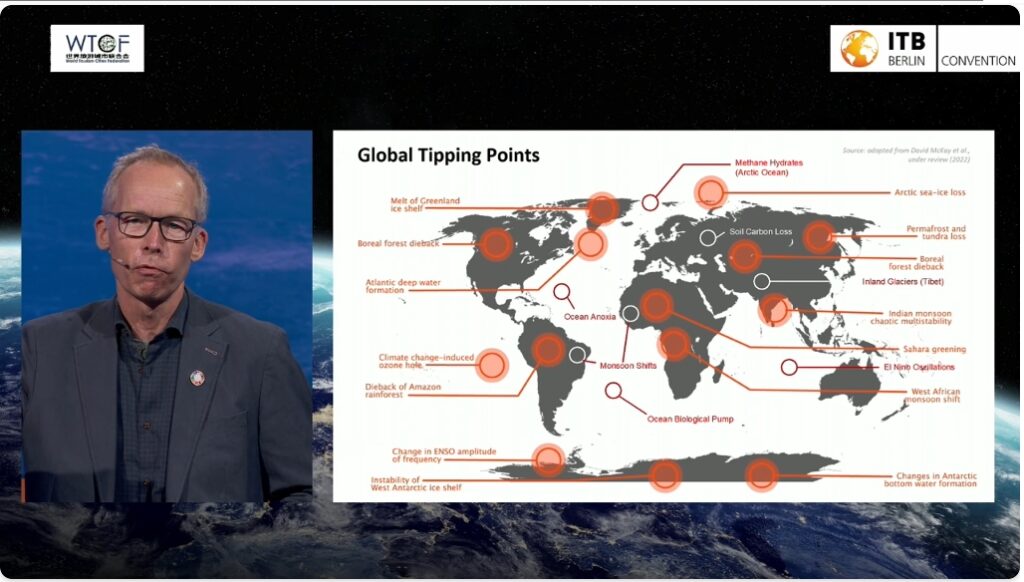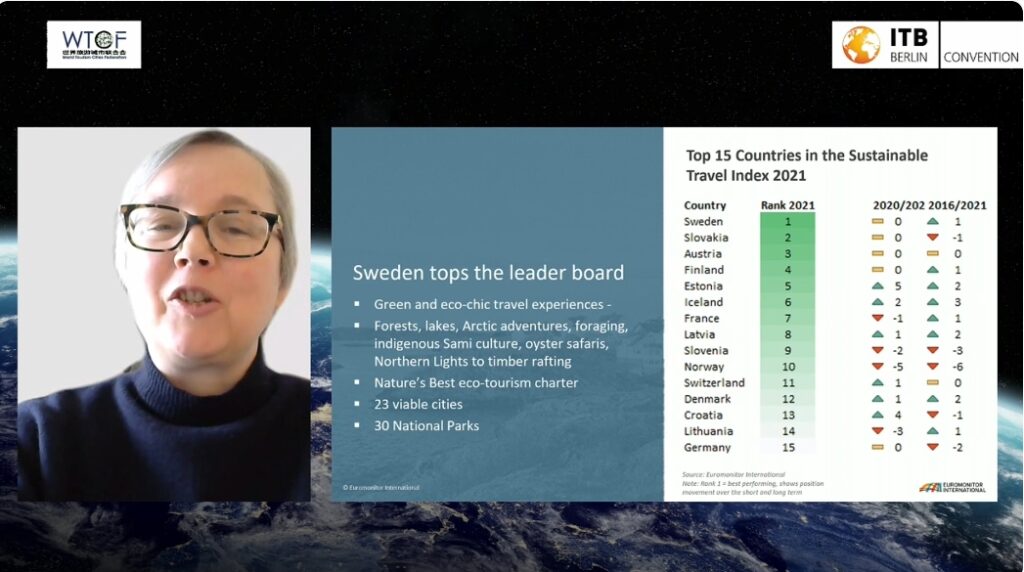ITB CONVENTION: HOW SUSTAINABILITY IN TOURISM CAN HELP REGENERATE THE WORLD
Sustainability and responsible tourism were the major topics up for discussion during the last day of the ITB Berlin Convention 2022.
Professor Johann Rockström, director of the Potsdam Institute for Climate Impact Research, told the convention’s global audience how preventing the earth’s temperature rising above 1.5°C is vital to keeping the planet healthy and how tourism must play its part in this task.
Sustainability has been at the heart of the ITB Berlin show for years and this year’s digital edition looked even more closely at this important topic. In her introduction, Rika Jean-François, ITB Commissioner Corporate Social Responsibility and Tourism Sustainability said:
“We cannot implement tourism without responsibility. We, at ITB Berlin, have been a front-runner in that field by giving a prominent role to sustainability. We indeed cannot continue to grow and grow because we only have one planet. And I am happy that our platform is being used to raise awareness among tourism stakeholders.”
One of the most urgent points on the agenda is to limiting the warming of the earth to 1.5°C above pre-industrial levels and related global greenhouse gas emission pathways. This was the plea of Professor Johann Rockström, director of the Potsdam Institute for Climate Impact Research.
“The cumulative scientific evidence is unequivocal: climate change is a threat to human wellbeing,” he said. “Any further delay in global action will miss a brief and rapidly closing window to secure a liveable future.”
According to Rockström, safeguarding biodiversity and ecosystems is fundamental to the earth’s resilience. He said: “Any alteration is connected with a recognised risk of destabilising the world. For example, ice melting in Greenland due to rising temperatures could slow down the Gulf Stream or alter the intensity of monsoons.”
The +1.5°C challenge
Capping the earth’s temperature at +1.5°C is a challenging target but one that the entire world is being encouraged to embrace. With this increase, the earth would already face potential devastation. Based on current policies, the planet temperature could be up by 2.7°C by 2100. If all the pledges and targets to neutrality in carbon by 2030 are implemented, the global temperature could still rise by 2.1° in 2100.
With a rise of over 2°C, sea level could rise by 2 to 6 meters while the weakening of what Rockström described as “Global Tipping Points” would also be affected. These tipping points include natural regulating phenomena or elements of the earth such as the Amazonian Rain forest, monsoons in India, South America or West Africa or the permafrost and tundra of Siberia. Almost three quarters of the Amazon rainforest’s resilience has been lost since 2000 due to mismanagement. The weakening resilience of the Tipping Points would accelerate negative trends and contribute to the earth’s instability.
And, global warming is already having an effect on tourism Rockström stressed.
“The tourism industry has been impacted earlier than previously thought,” he said. “Look at skiing resorts where there is a regular absence of snow. Their stability is already getting lost.
“We also see an average of 10 to 20 disturbed days per cruise season along the Danube river due to low water levels.”

Tourism already affected by global warming
Tourism is in the midst of these changes as it has an impact on transportation, emissions or the use of various resources such as water. Tourism is accounting for around 8% of global greenhouse gas emissions (GHG) with an annual average growth of 4%, and it must work to retain its appeal to travellers. Tourism activities transgress four of the five pillars which shape the planet boundaries: climate, biodiversity, land use and biogeochemical flows.
How do we manage the inevitable?
“It is possible to do so but tourism activities must follow a fast track path,” said Johan Rockström. “A single individual cannot reverse an entire system’s failure. However, individuals can put pressure on the political and economic world to act. Good hospitality business is also about informing guests about climate change and encouraging them to talk, and feel enthusiastic about it.”
“All tourism stakeholders can easily find ways to reduce emissions in their own field by 7% to 10% per year. And reach 100% carbon neutrality by 2050. It requires involvement.”
Europe leading in sustainable practices
There is hope as more destinations embrace sustainability targets. According to the Euromonitor International Travel Index measuring how sustainable destinations, Europe is leading the way.
“The EU green deal has obviously a tangible impact. European made the top 20 of the world’s most sustainable destinations,” said Caroline Bremner, Head of Travel and Tourism Research Euromonitor International, in her presentation.

Sweden, Slovakia, Austria, Finland and Estonia were the top five from a total of 99 surveyed countries. Among the top 15 cities for Sustainability, 12 were located in Europe. Madrid, Stockholm, Dublin, Brussels and Berlin topped the survey. Bremner also pointed out the strong commitment of Central and South American countries to turn more sustainable. In the list of the top 15 “Most Improved Rank Performance” countries, 5 of them are located in that region with the Dominican Republic, Guatemala and Costa Rica leading the way.
Sustainable tourism policies are of utmost importance. “66% of global consumers want to have a positive impact on their environment on their daily lives according to our Euromonitor lifestyle survey,” stressed Bremner.
